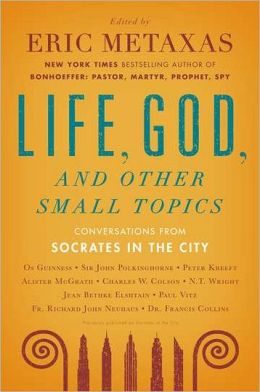The Book
Socrates in the City: Conversations on "Life, God, and Other Small Topics"Eric Metaxas
This book was placed in my hands with no prior buildup. Usually, a friend will talk up a book a few times before they hand the volume over to me. This book was literally placed in my hand with no warning and I was told to read it because it did a very good job of presenting many approaches to Apologetics.
My friend was right.
Technical Merit
It is hard to judge the technical merit of this book since it is a transcription. Socrates in the City is an informal lecture series hosted by Eric Metaxas where the brightest minds in all kinds of Apologetics get together to ask the big questions about life.
I give the work 3.5 stars because the editing is quite good. The format of the lecture is as follows: Eric Metaxas introduces the speaker, the speaker gives their lecture and there is a set time for questions and answers. Given the format and the live nature of the entire setting, the potentially weakest point is the Q&A. However, they were able to mitigate most of the difficulties with Q&A transcription and, at times, it becomes a strength.
Metaxas is a very humorous man, though some of the humor reads with a "you had to have been there" tone. This should come as no surprise for Veggie Tales fans, as he worked extensively with the program and narrated the movie dealing with Queen Esther. Still, the humor helps cut the dry, somber nature of the topics addressed.
Review
This book approaches 360 pages and covers a lot of different approaches to Apologetics, including scientific, philosophical, literary, political and historical, to name a few. Speakers range from Charles Colson to Alister McGrath to Francis Collins. The range of voices is actually quite diverse.
As was mentioned earlier, Eric Metaxas engages in witty banter with the audience that, at times, does not translate well to print. For the most part, I skipped over the introductions and got right into the main speaker's lecture. I suggest reading the first introduction and deciding whether that humor appeals to you or not.
Takeaway
I enjoyed the lecture given by Sir John Polkinghorne entitled Belief in God in an age of science. It was thorough and debunked the dualistic thought process that believes that one must be either a good scientist or a good Christian and there is no room for middle ground. Polkinghorne lays out how these two aspirations are not mutually exclusive. He believes that by studying the universe in it's complexity we can appreciate God's creativity within the system he has put in place.
My next favorite piece (lecture) was Paul Vitz's The importance of fatherhood, which directly pointed out the fact that most of the great Athiests had no strong father figure in their lives. On the other hand, most of the great defenders of Christianity had strong father figures. The term "Father Figure" is used because this figure need not be the biological father, it could be a grandfather, uncle, male neighbor or male church member who takes an interest in the child's life.
During this lecture, Paul Vitz also describes a shift he is seeing with regard to traditional values. He states that in the middle of the 1900s we had Modernism which called into doubt some of our traditions and criticized them in the light of higher learning. Soon, Post-Modernism took it another step and simply rejected traditions offhand as passe. Now, Vitz argues that we are seeing Trans-Modernism where we realize on a qualitative level the benefit of previously unchallenged traditions. Having strong father figures happens to be one of these traditions that we should be realizing is a good thing.
In the end, I heartily recommend this book. It avoids the technical nature that an entire book on Apologetics tends to run into due to Metaxas' humor but still tackles all the tough topics.


